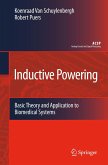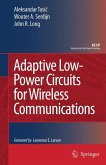Inductive powering has been a reliable and simple method for many years to wirelessly power devices over relatively short distances, from a few centimetres to a few feet. Examples are found in biomedical applications, such as cochlear implants; in RFID, such as smart cards for building access control; and in consumer devices, such as electrical toothbrushes. Device sizes shrunk considerably the past decades, demanding accurate design tools to obtain reliable link operation in demanding environments. With smaller coil sizes, the link efficiency drops dramatically to a point where the commonly used calculation methods become invalid.
Inductive Powering: Basic Theory and Application to Biomedical Systems lists all design equations and topology alternatives to successfully build an inductive power and data link for your specific application. It also contains practical guidelines to expand the external driver with a servomechanism that automatically tunes itself to varying coupling and load conditions.
Inductive Powering: Basic Theory and Application to Biomedical Systems lists all design equations and topology alternatives to successfully build an inductive power and data link for your specific application. It also contains practical guidelines to expand the external driver with a servomechanism that automatically tunes itself to varying coupling and load conditions.








